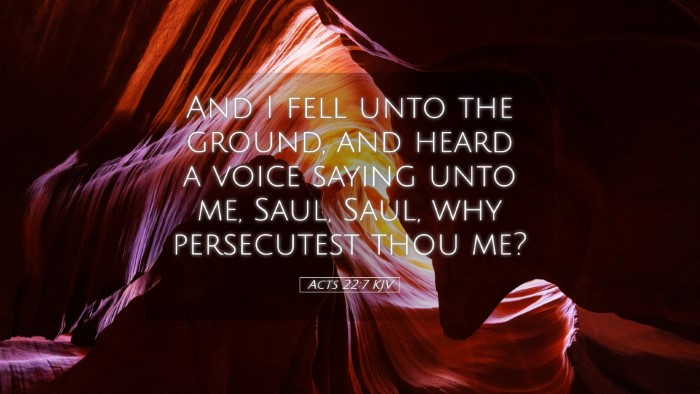Commentary on Acts 22:7
Verse: “And I fell to the ground and heard a voice saying to me, 'Saul, Saul, why are you persecuting me?'”
Introduction
The conversion of Saul of Tarsus, later known as the Apostle Paul, is one of the pivotal events in early Christianity. Acts 22:7 highlights a moment of divine intervention and profound personal transformation. This verse reflects not only Saul's physical encounter with the risen Christ but also the spiritual awakening that follows. Here, we will explore insights from various public domain commentaries to extract the theological, historical, and practical implications of this passage.
The Context of the Passage
Saul's conversion occurs while he is on the road to Damascus, armed with letters from the high priest to hunt down Christians. The dramatic nature of his encounter signifies a turning point not just for Saul, but for the early church as well. Matthew Henry notes that this event underscores God's sovereign grace reaching out to the undeserving.
Matthew Henry's Observations
- Henry emphasizes the importance of the repetition of Saul’s name: “Saul, Saul.” This dual invocation brings attention to God's personal call and signifies earnestness.
- He asserts that the voice signifies Christ's presence among His people, indicating that persecution against Christians is directly against Him.
Albert Barnes’s Insights
- Barnes reflects on the significance of falling to the ground. This act symbolizes humility and surrender before the divine authority.
- He also draws attention to the question posed by Jesus, which prompts deep self-reflection. It serves as a wake-up call not only for Saul but also for all believers regarding their actions against Christ’s body, the Church.
Adam Clarke's Commentary
- Clarke discusses the implications of Saul's oppositional role and how it transforms into one of passionate advocacy for the faith he once persecuted.
- He highlights that the phrase “why are you persecuting me” emphasizes the unity and connectivity of Christ with his followers, portraying that their suffering is His suffering.
Theological Implications
This encounter underscores several key theological themes:
- Divine Sovereignty: Saul’s encounter with Jesus illustrates how God intervenes in human affairs, orchestrating events to fulfill His purposes.
- Identity of Christ with Believers: The identification of believers with Christ is profound, suggesting that the treatment of His people reflects one’s attitude toward Him.
- Repentance and Transformation: Saul’s experience exemplifies the power of repentance. His transformation is emblematic of the radical change that occurs when one meets Christ.
Historical Background
Understanding the historical context enhances the meaning of this passage. Saul was a Pharisee steeped in Jewish law, fiercely dedicated to the beliefs of his faith. His encounter on the road to Damascus represents not only a personal change but also a shift in the narrative of the early church, emphasizing the expansion of the Gospel into the Gentile world.
Practical Applications for Believers
Pastors, students, and theologians can derive multiple applications from Acts 22:7:
- Listening to God: As Saul heard the voice of Jesus, believers are encouraged to cultivate a listening posture towards God’s direction in their lives.
- Responding to God’s Call: The nature of the call can be disruptive; thus, believers should be prepared for radical change and transformation.
- Understanding Unity in Persecution: Christians today are reminded that the church is one body. Persecution of believers reverberates as an attack against Christ Himself.
Conclusion
Acts 22:7 is a powerful testament to the transformative encounter of Saul with Christ. The insights garnered from Matthew Henry, Albert Barnes, and Adam Clarke enrich our understanding of this pivotal moment in biblical history. As believers reflect on this verse, they are reminded of God’s sovereignty, the importance of unity among Christians, and the profound nature of true repentance and transformation. This passage serves as a powerful reminder of how one encounter with Christ can alter the course of a life and, ultimately, the trajectory of history.


